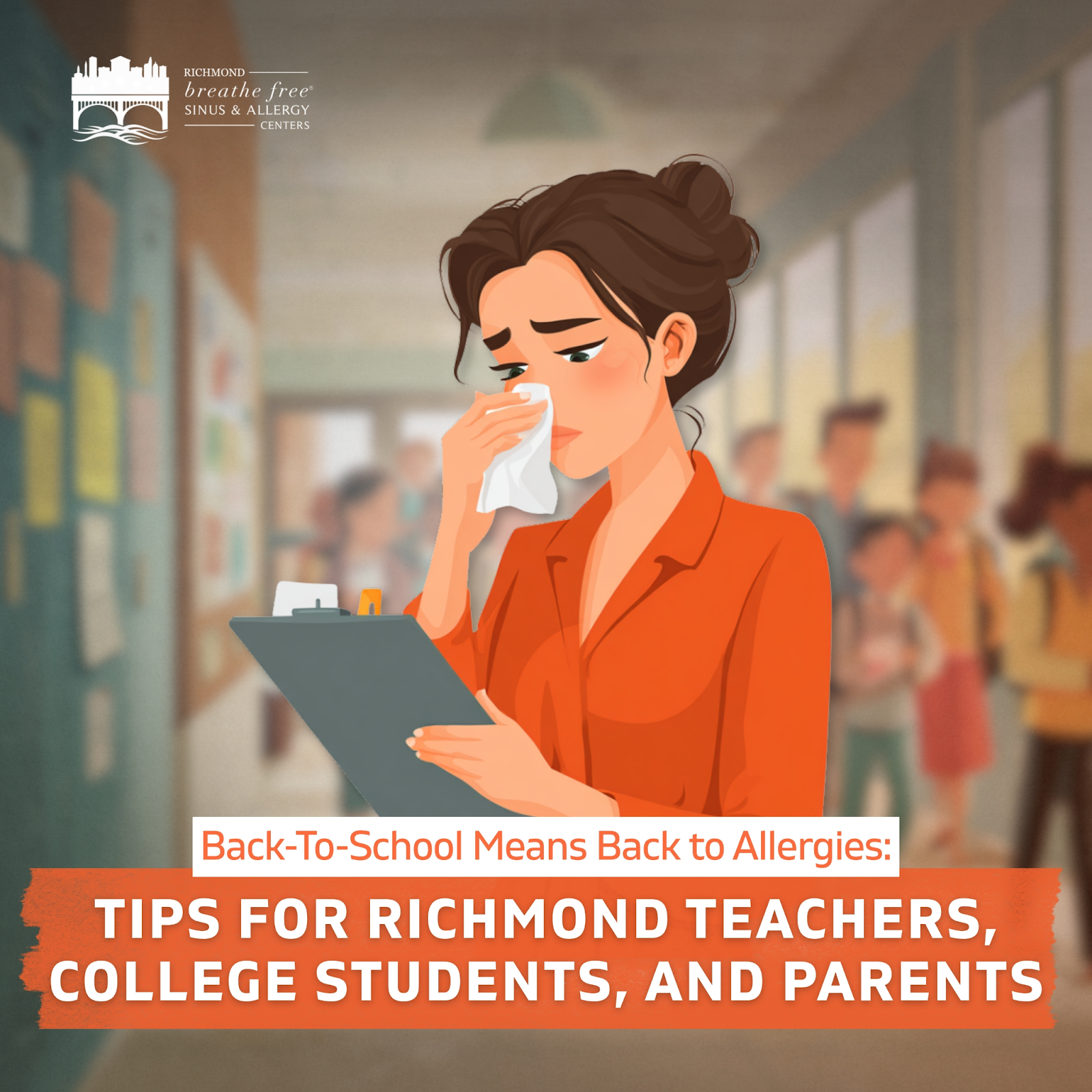Back-To-School Means Back to Allergies: Tips for Richmond Teachers, College Students, and Parents
Summer is coming to a close, and we are inching closer and closer to back-to-school season.
Back-to-school season means students, teachers, and parents are heading back to classrooms, lecture halls, and offices. This also means allergies and sinus flare-ups become increasingly common.
In environments where so many people go in and out of doors, coming from several different areas, allergies are bound to increase as well. If left untreated, common allergy symptoms like congestion, frequent sneezing, cough, runny nose, and headaches can quickly impact productivity, memory, and the ability to concentrate. These can all affect school and work performance.

Common Back-To-School Allergies: Richmond Residents Must Know
Allergies can result from many environmental sources, including:
- Pollen, which is widespread during much of the year.
- Indoor allergens, including dust, dust mites, pet dander, mold, and mildew.
- Food allergens, which may be present in cafeteria food or shared snacks.
- Latex, found in school supplies like balloons, sports gear, and rubber bands.
While allergies often begin during childhood, new allergies in adulthood are also possible.
Managing Back-To-School Allergies: Tips for Students, Parents, and Teachers
1. See an allergist
An allergy test nd consultation with a board-certified Richmond allergist can help identify what’s triggering your symptoms — and whether sinus issues are allergy-related. Your provider can also offer personalized treatment recommendations.
If symptoms are more severe, sublingual immunotherapy might be a helpful option for reducing allergy symptoms over time.
2. Manage and limit exposure to environmental irritants
You can take several steps to reduce your exposure to common allergens.
When outside:
- Check pollen forecasts and adjust your schedule when counts are high.
- Wear sunglasses, a dust mask, and a hat to limit pollen contact.
At home:
- Keep indoor spaces clean by dusting and vacuuming regularly.
- Wash bedding, pillowcases, and linens frequently.
- Bathe pets often, keep them off beds, and wipe them down after outdoor time.
- Remove shoes and change clothes after coming home from outside.
- Use an indoor air purifier to help reduce airborne allergens.
3. Keep yourself healthy and boost your immunity
While allergies don’t weaken your immune system directly, maintaining good overall health may reduce the risk of allergic inflammation leading to further sinus complications. Here are a few ways to support your system:
- Stay hydrated to keep mucus thin and aid sinus drainage.
- Eat a balanced diet rich in vitamins and minerals.
- Get sufficient rest and quality sleep.
- Practice regular handwashing and other hygiene habits.
4. Try steam inhalation
Steam inhalation — whether through a warm shower or a bowl of hot water — can help soothe irritated sinuses and loosen mucus, promoting better drainage.
5. Try sinus medications
Some over-the-counter medications may provide temporary relief during peak allergy season:
- Decongestants may reduce sinus swelling and encourage mucus drainage.
- Antihistamines help block your body’s allergic response.
- Pain relievers may ease headaches or facial pressure, supporting comfort during school or work.
- Saline nasal sprays can help rinse out allergens and reduce sinus irritation.
Always consult your healthcare provider or Richmond sinus specialist before beginning new medications.
Richmond Breathe Free Is Your Local Allergy and Sinus Expert
If you’re looking for a Richmond sinus doctor you can trust with your allergy or sinus concerns, you're in the right place. At Richmond Breathe Free, we understand how frustrating seasonal and environmental allergies can be — especially when they interfere with focus, energy, and productivity.
Millions of Americans are affected by allergies every year — but that doesn’t mean you have to keep suffering. Schedule a consultation with our board-certified allergists and sinus experts to explore personalized treatment plans that may help you manage symptoms and support better breathing throughout the school year and beyond.

.png)